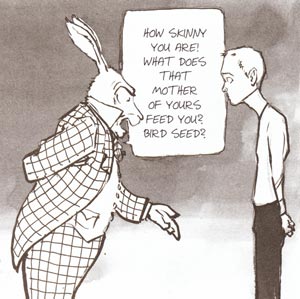Hey there, Internet! As a librarian, I’m very positive on graphic novels. They’re a wonderful stepping stone for reluctant readers, and the use of pictures does as much for the story as the words. Today’s selection is a surprising autobiography from the mind of a celebrated illustrator. I give you…
Stitches: A Memoir by David Small
David Small's work has appeared in children's stories such as The Essential Worldwide Monster Guide, The Mouse and His Child, and That Book Woman. He has also illustrated books written by his wife, Sarah Stewart.
Stitches tells of his early childhood during the first golden age of radiology. Small's father, a doctor, believed that exposing his son to radiation, he could cure him of his respiratory problems. (In his defense, this was back during a time when they thought using DDT was a good idea, too.) Small describes his childhood as being very lonely, as his family is emotionally distant from each other, and he doesn't seem to have any friends.
As Small gets older, he begins to develop a strange growth on his neck. Further examination takes him into surgery, after which he wakes up, his neck "stitched up like a bloody boot." However, the worst part is that his operation has left him unable to speak. It becomes an existence of cruel irony: having no voice and being trapped with people who refuse to speak with one another. Small works up the courage to run away from home at sixteen with nothing but the dream of becoming an artist as he works toward finding a voice and piecing his life back together.
Stitches is told more through pictures than words, but the illustrations speak volumes, conjuring terrifying fantasies and showing the full depths of frustration and despair. Small shows his strained relationship with both his parents, and the shock of uncovering deep-seeded secrets. It's a story that's tragic, infuriating, and surreal (for example: Small portrays his therapist as the White Rabbit). Even so, I found it to be impossible to put down, and by story's end, the reader is left feeling uplifted and hopeful.
Image copyright by David Small. Source: http://www.grovel.org.uk/wp-content/uploads/2009/09/stitches-03.jpg





